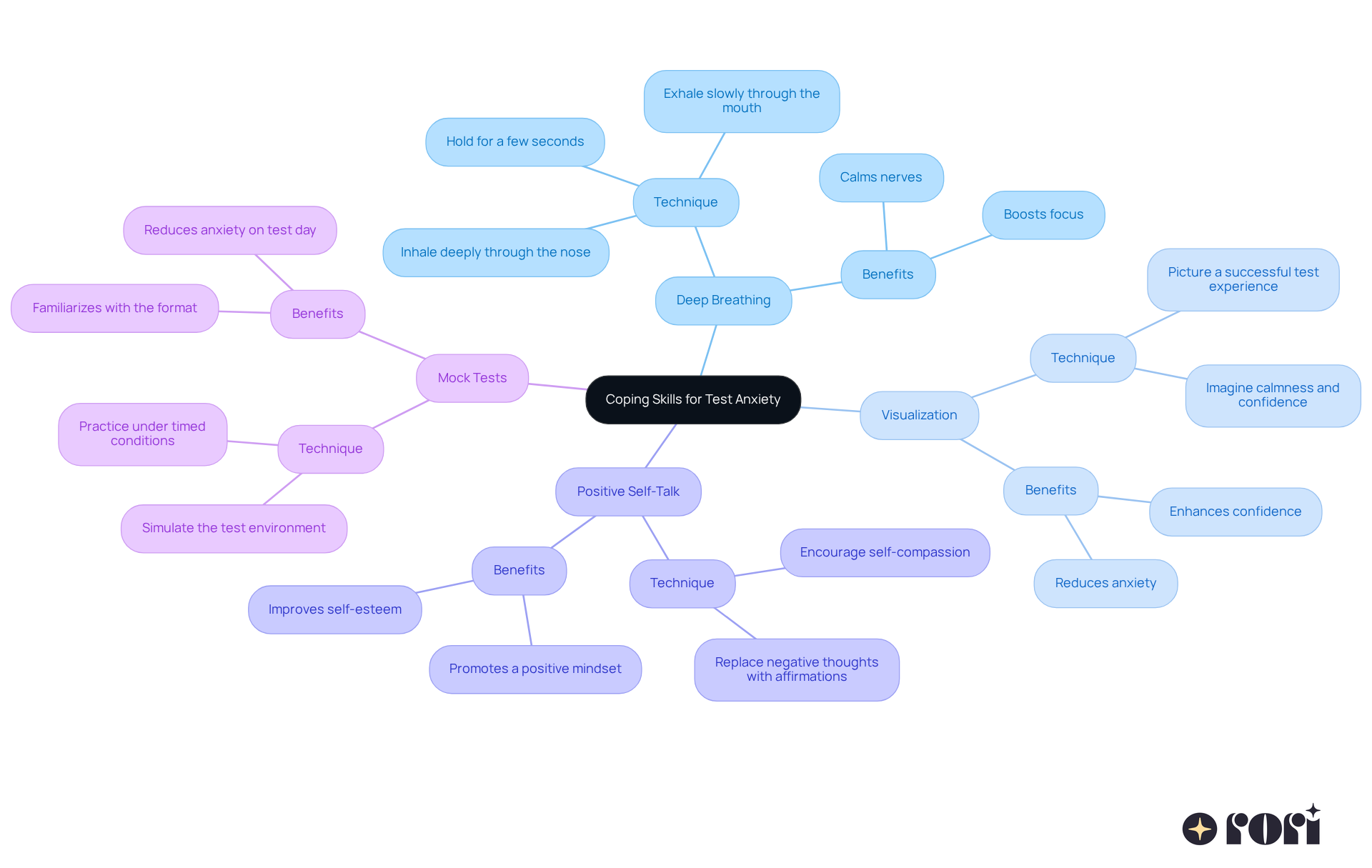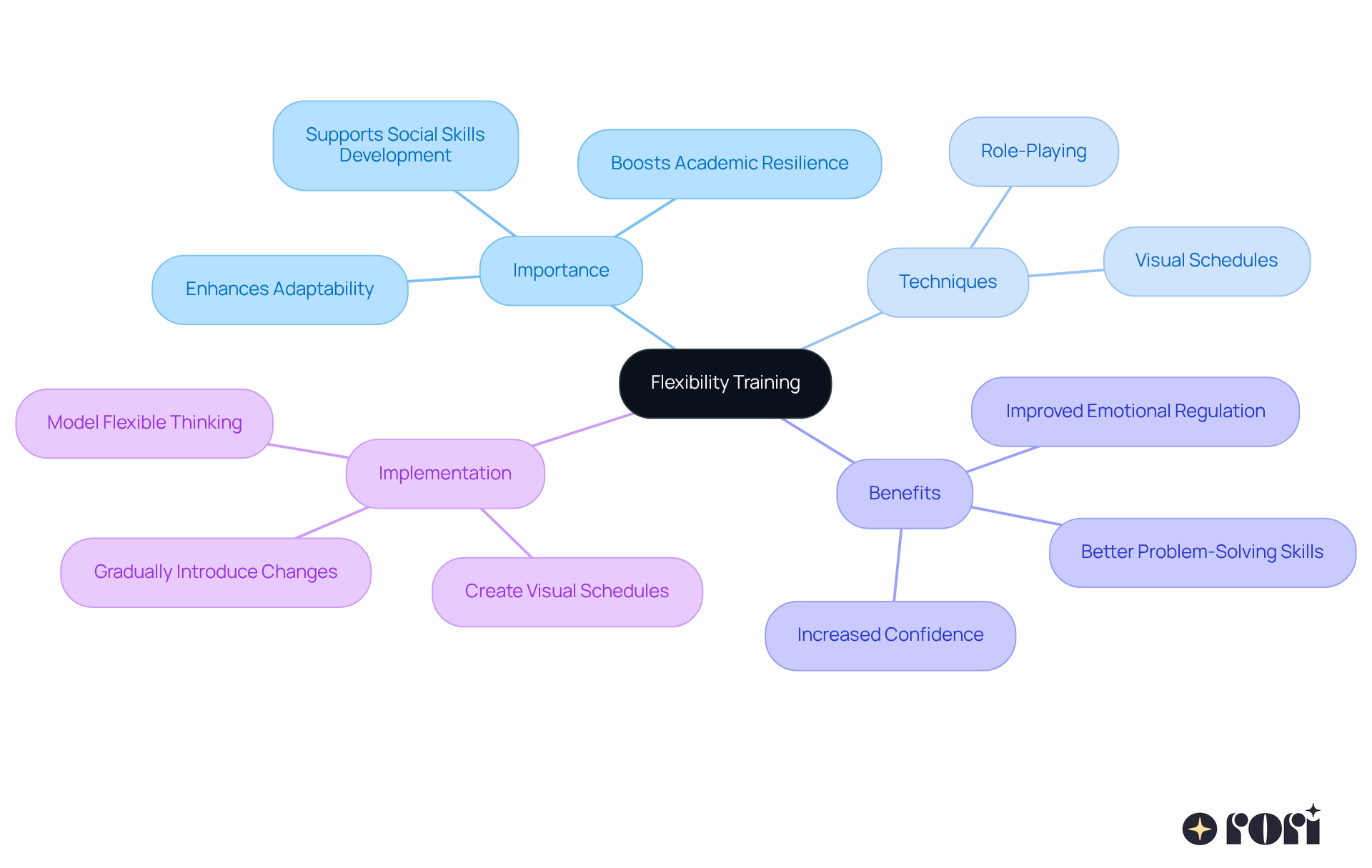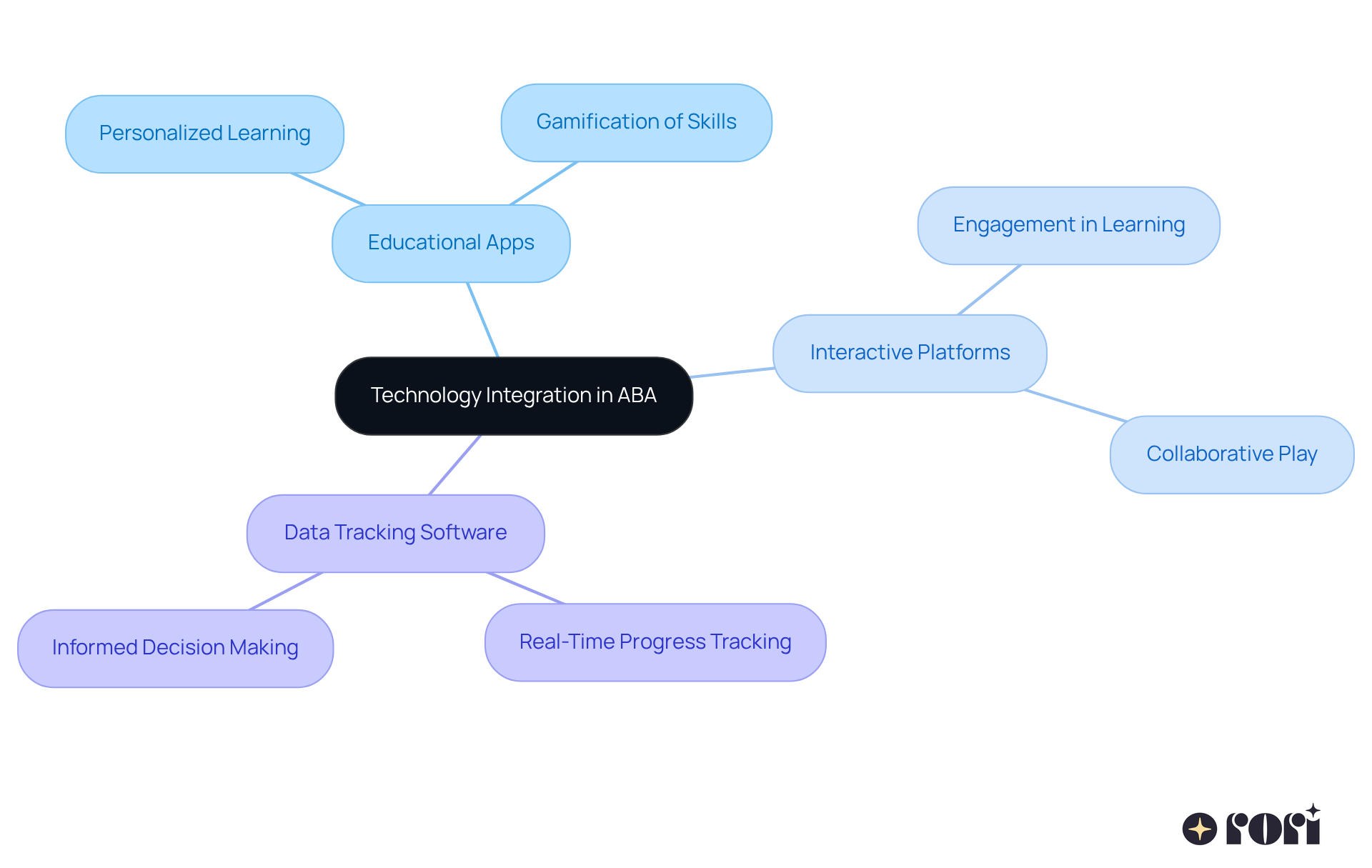Understanding the unique challenges kids face in school is so important for helping them succeed. Effective ABA therapy strategies can offer personalized support that not only meets individual learning needs but also empowers young learners to really thrive.
As parents and educators navigate the ups and downs of academic achievement, you might wonder: how can tailored ABA techniques change a child's educational experience and boost their performance in the classroom? Let’s explore this together!
There’s a treasure trove of strategies out there designed to unlock each child's potential, paving the way for a brighter future. We’re here to help you every step of the way!
At Rori Behavioral Innovations, we understand that every child is unique, and that’s why we take a data-driven approach to ABA therapy. Our focus is on creating tailored ABA therapy strategies for academic success that meet the specific educational needs of each individual. By conducting thorough evaluations, our clinicians can pinpoint the areas where a student might be struggling academically, enabling us to implement ABA therapy strategies for academic success that truly make a difference.
For instance, if a young learner finds reading comprehension challenging, we might implement specialized reading techniques within the ABA framework. This ensures that they receive the support they need to thrive in their learning environment by implementing ABA therapy strategies for academic success.
We believe that adopting ABA therapy strategies for academic success not only enhances educational outcomes but also fosters a sense of accomplishment and motivation in young individuals. It’s all about paving the way for their success in studies and beyond by implementing ABA therapy strategies for academic success!
Let’s explore this together! If you’re a parent navigating these challenges, know that you’re not alone. We’re here to help you every step of the way!

Positive reinforcement is such a powerful strategy! It’s all about recognizing and rewarding those desired behaviors to encourage kids to keep it up. In the world of education, this might look like cheering on a student for finishing their homework or giving out little rewards when they hit certain milestones. You know, studies show that kids who receive regular positive reinforcement as part of ABA therapy strategies for academic success are way more likely to dive into their education and show improved academic performance.
For example, one study found that when teachers used a token system - where students earn tokens for good behavior that they can trade for rewards - students focused on their tasks up to 30% more! Isn’t that amazing? This approach not only keeps kids engaged in their studies but also incorporates ABA therapy strategies for academic success, creating a positive learning environment that enhances their overall experience. By building a culture of recognition and reward, educators can effectively incorporate ABA therapy strategies for academic success to lift student morale, boost participation, and improve academic outcomes.
Let’s explore this together! By fostering a supportive atmosphere, we can help our kids thrive in their educational journeys.

Discrete Trial Training (DTT) is a wonderfully organized way to teach kids by breaking down complex skills into bite-sized, manageable pieces. Each skill is tackled through a series of trials where kids get to respond, receive immediate feedback, and enjoy some well-deserved praise for their correct answers. This structured approach utilizes ABA therapy strategies for academic success, working wonders in classrooms and helping young learners master essential skills in math and reading through consistent practice and reinforcement.
For example, when a child is learning addition, they might engage in several attempts that gradually increase in difficulty as they get the hang of it. This method can lead to impressive improvements in their learning outcomes! Research shows that kids using ABA therapy strategies for academic success, particularly DTT for math and reading, often achieve higher proficiency rates compared to those who use less structured methods. It really highlights how effective ABA therapy strategies for academic success can be in boosting overall academic achievement.
At Rori Care, our behavior care engine is always fine-tuning treatment plans based on progress reports, ensuring that we have adaptive strategies in place. And let’s not forget the crucial role of caregivers! When suggested hours are fully utilized with active participation, we see significant progress in 90% of young individuals. That’s something to celebrate!
Educators emphasize the importance of structured teaching methods, noting that ABA therapy strategies for academic success, including DTT, provide a clear framework that helps kids grasp and retain new concepts. There are so many success stories out there! Many parents share how their children have made remarkable strides in their educational skills through DTT, showcasing its ability to transform learning experiences.
So, if you’re curious about how DTT can help your child, let’s explore this together! We’re here to support you every step of the way!

Social interaction training is so important for helping young people connect with their peers and adults. It’s a key ingredient in applying ABA therapy strategies for academic success! Skills like sharing, taking turns, and communicating effectively really boost a child’s ability to work in groups and join in classroom discussions.
Think about role-playing situations - these create a safe space for kids to practice their social skills, building their confidence in interactions. Studies show that children who apply ABA therapy strategies for academic success often shine academically because they’re more likely to engage with their classmates and ask for help when they need it.
Plus, research indicates that comprehensive social-emotional learning (SEL) programs lead to broader behavioral and educational improvements. This really strengthens the connection between social skills and academic achievement by utilizing ABA therapy strategies for academic success. By focusing on social development training, educators can implement ABA therapy strategies for academic success that create a nurturing learning environment, enhancing peer interactions and supporting overall academic achievement.
Let’s explore this together! Encouraging our kids to develop these skills can make a world of difference.

Coping skills for test anxiety are so important for helping our kids shine under pressure! 🌟 Techniques like deep breathing, visualization, and positive self-talk can really empower them to handle their nerves. For instance, encouraging a young person to take a few deep breaths before a test can work wonders in calming those jitters and boosting focus.
And here’s a little tip: practicing mock tests in a relaxed environment can help students get used to the testing format. This way, when the big day arrives, they feel more at ease and ready to tackle it! By equipping our young ones with these handy coping strategies, we can help build their confidence and improve their performance during assessments. Let’s explore this together and support our kids every step of the way!

Collaboration and cooperation skills are so important for creating educational environments where students can truly thrive. Think about it: when kids work on team projects or help each other out, they’re not just learning academically; they’re also picking up essential skills for working together. For example, when two students team up for a science project, they get to communicate, share ideas, and support each other in reaching a common goal.
Recent studies show that students who engage in cooperative learning tend to perform better academically and develop stronger social skills. These skills are vital for success, both in school and beyond! This approach creates a space where students can excel while also building the interpersonal skills they’ll need for future teamwork. It’s especially beneficial for those with autism, as ABA therapy strategies for academic success help enhance their social skills and ability to collaborate.
At Rori Care, we believe in empowering caregivers with ABA therapy strategies for academic success. This way, families can be actively involved in their loved ones' growth, leading to better behavioral outcomes and informed decision-making. Let’s explore this together! We’re here to help you every step of the way!

Flexibility training is so important for helping kids learn how to adapt to changes and unexpected situations. This not only boosts their academic resilience but also sets them up for success in life! 🌟 Techniques like role-playing different scenarios or using visual schedules can really help young ones adjust their expectations and responses. For example, if you gradually introduce small changes to your child's routine, it can make them feel more comfortable with being flexible.
This personalized approach is rooted in the principles of learning and behavior through ABA therapy strategies for academic success. It’s designed to enhance social skills and build confidence for kids with Autism, ADHD, Social Communication Disorders, Anxiety Disorders, and others striving for social competence. Research shows that kids who develop strong adaptability skills tend to handle educational challenges and transitions better, which can be enhanced through ABA therapy strategies for academic success, leading to improved overall performance.
So, how can you implement flexibility training at home? Start by creating a visual schedule that includes both routine and flexible activities. This way, your child can understand and anticipate changes, making the process smoother for everyone. Let’s explore this together! We’re here to help you every step of the way!

Managing disruptive behaviors can be a real challenge for parents, especially when they utilize ABA therapy strategies for academic success. One of the best ways to tackle this is by establishing clear expectations. When kids know what's expected of them, they're much more likely to rise to the occasion. For example, having a classroom rule that rewards students for staying on task not only encourages positive behavior but also helps them feel accountable for their actions.
Research shows that classrooms that use effective behavior management techniques see significantly fewer disruptions. This creates a more supportive and nurturing educational atmosphere, which is something we all want for our kids! Positive reinforcement, like verbal praise or small rewards, tends to work wonders compared to punitive measures. It motivates students and builds their confidence, making them more eager to engage in their learning.
Structured routines are another key element. They provide kids with a predictable framework, which can really help reduce anxiety and boost focus. When students know what to expect, they tend to flourish, leading to better behavior and improved performance.
Visual cues and reminders can also be super helpful for kids trying to stick to classroom expectations. These little prompts guide them in navigating their responsibilities and staying engaged. By focusing on teaching rather than punishing, educators can utilize ABA therapy strategies for academic success to steer students toward better behavior, ultimately supporting their academic journey and personal growth.
At Rori Care, we’ve got a fantastic behavior care engine that performs functional behavior analysis for target behaviors and skills. It even generates automatic progress reports for clinician review! This data-driven approach not only helps educators apply effective strategies but also empowers caregivers with ABA therapy strategies for academic success to support their child's behavioral goals.
Caregivers can use insights from our behavior care engine to reinforce positive behaviors at home, ensuring everyone is on the same page. By engaging with the information provided, parents can make informed choices that enhance their child's growth and educational achievement. Let’s explore this together! We’re here to help you every step of the way!

Parental engagement is so important for helping our kids succeed in school! When parents get involved in their children's education, it can lead to better attendance, improved behavior, and greater academic success. Simple strategies like keeping regular communication between teachers and parents, encouraging participation in school activities, and providing resources for at-home learning can make a big difference.
For instance, think about how motivating it can be for parents to join in on homework sessions or attend school events. This creates a collaborative environment where everyone is working together for the child's success. Studies show that kids with actively engaged parents tend to perform better in school. Isn’t that encouraging?
Research also indicates that when parents are involved, children often feel more capable, which can strongly predict their educational achievements. Plus, a positive relationship between students and teachers, supported by parental participation, can lead to better social and academic outcomes for our kids.
By building strong partnerships between parents and educators, we can implement ABA therapy strategies for academic success, creating a supportive framework that helps young learners thrive academically. And let’s not forget about the importance of caregiver education in ABA therapy strategies for academic success! This equips parents with the knowledge and skills they need to provide effective support at home, complementing professional interventions.
When caregivers feel confident, they can make informed decisions that positively impact their children's progress, leading to better behavioral outcomes and enhanced support. So, let’s explore this together! We’re here to help you every step of the way!

Incorporating technology into ABA therapy strategies for academic success opens up exciting opportunities for boosting achievements among individuals with autism! 🎉 Think about it: educational apps, interactive platforms, and data tracking software can create personalized experiences that cater to each child's unique needs. For instance, apps that gamify math skills not only make learning fun but also help kids retain and understand concepts better.
Plus, technology allows for real-time data collection, which means clinicians and educators can easily track progress and adjust strategies as needed. Research shows that kids using tech-enhanced learning tools often see significant improvements in their academic performance, which can be attributed to ABA therapy strategies for academic success that help them feel more motivated to learn. This approach not only builds essential skills but also creates a lively and responsive educational environment.
Let’s explore this together! If you’re curious about how these tools can help your child, don’t hesitate to reach out for more information!

Implementing tailored ABA therapy strategies is so important for helping our kids succeed academically! By recognizing each child’s unique needs, we can create personalized approaches that really boost educational outcomes and build their confidence. Focusing on structured methods like positive reinforcement, Discrete Trial Training, and social skills training gives us a solid framework that not only tackles academic challenges but also nurtures essential life skills.
Throughout this article, we’ve highlighted key strategies that show:
Plus, let’s not forget the vital role of parental involvement and technology integration! These elements reinforce the idea that a supportive and adaptable learning environment is crucial for academic success. Each piece of this puzzle contributes to a holistic approach that empowers our children to thrive in their educational journeys.
Ultimately, we can’t underestimate the significance of personalized ABA therapy strategies. By embracing these techniques, we-parents, educators, and caregivers-can create a nurturing atmosphere that fosters resilience, collaboration, and a love for learning. As education continues to evolve, let’s stay committed to implementing these effective strategies, ensuring that every child has the chance to succeed academically and beyond. Let’s explore this together!
What is the approach of Rori Behavioral Innovations towards ABA therapy?
Rori Behavioral Innovations takes a data-driven approach to ABA therapy, focusing on creating personalized strategies for academic success that cater to the individual educational needs of each child.
How does Rori Care assess a child's academic challenges?
Clinicians at Rori Care conduct thorough evaluations to identify specific areas where a student may be struggling academically, allowing for the implementation of targeted ABA therapy strategies.
Can you provide an example of how ABA therapy is applied in academic settings?
If a child struggles with reading comprehension, Rori Care might implement specialized reading techniques within the ABA framework to provide the necessary support for academic success.
What is the role of positive reinforcement in ABA therapy?
Positive reinforcement involves recognizing and rewarding desired behaviors to encourage students to continue those behaviors, which can significantly enhance engagement and academic performance.
How effective is positive reinforcement in improving student performance?
Studies have shown that students who receive regular positive reinforcement as part of ABA therapy strategies are more likely to engage in their education and show improved academic performance, with some methods increasing task focus by up to 30%.
What is Discrete Trial Training (DTT)?
Discrete Trial Training (DTT) is a structured teaching method that breaks down complex skills into smaller, manageable parts, allowing children to respond, receive immediate feedback, and earn praise for correct answers.
How does DTT impact learning outcomes for children?
Research indicates that children using DTT for subjects like math and reading often achieve higher proficiency rates compared to those using less structured methods, highlighting its effectiveness in boosting academic achievement.
What role do caregivers play in the success of ABA therapy strategies?
Active participation from caregivers is crucial; when suggested hours are fully utilized, significant progress is observed in 90% of young individuals receiving ABA therapy.
How does Rori Care adapt its treatment plans?
Rori Care continuously fine-tunes treatment plans based on progress reports to ensure adaptive strategies are in place for each child.
What success stories exist regarding DTT and academic achievement?
Many parents have reported remarkable improvements in their children's educational skills through the use of DTT, showcasing its ability to transform learning experiences.